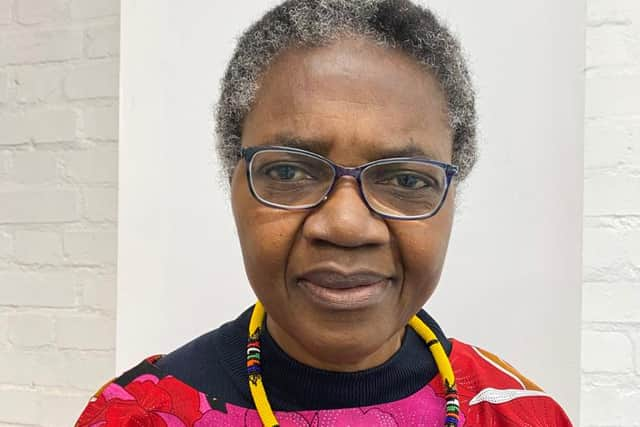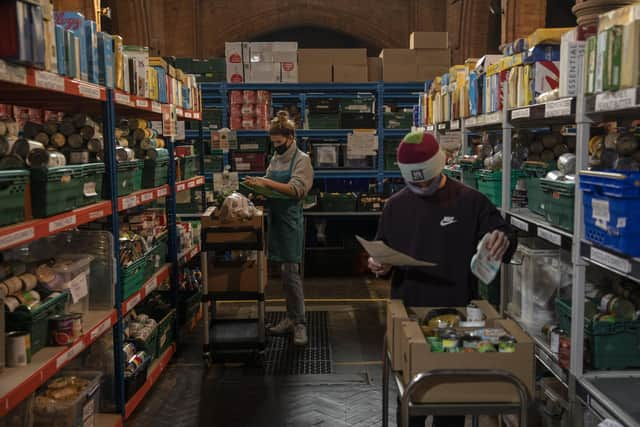‘Underfed’ London children surviving on ‘£1 oil-sodden chips’ as malnutrition cases double in a decade
and live on Freeview channel 276
“Underfed” children in poverty are living on “£1 oil-sodden chips”, a Barnet foodshare manager has warned, as malnutrition cases in the UK have doubled in the last 10 years.
Cases of malnutrition have more than doubled over the past decade, while foodbank charity The Trussell Trust gave out more food parcels in London than in any other region of the UK.
Advertisement
Hide AdAdvertisement
Hide AdFears over food being “scant or unavailable” have been raised by charities in the capital.
Hope Yoloye, from Barnet Foodshare Co-op, said: “Poverty is mostly the cause of malnutrition and scurvy.
“Our experience is that children and young people have £1 to buy oil-sodden chips from fish and chip shops or takeaways, and that may be their only main meal throughout the day.
“Money can only buy what it can buy, and if it is scant or unavailable, then the victim goes without food or is underfed.”


Advertisement
Hide AdAdvertisement
Hide AdAnd Ms Yoloye, who is projects manager Living Way Ministries, in Colindale, Barnet, said: “Unwholesome foods are also a lot cheaper than organic, healthy food stuff.
“It is even harder for someone homeless, living in temporary accommodation or in poverty to get a full range of nutrients.
“They may have no source of regular income to plan proper meals with - and no resources to cook balanced meals even if they hit a jackpot of money to spend.
Advertisement
Hide AdAdvertisement
Hide Ad“While the uncertainty of temporary accommodation is so unsettling that people cannot plan their lives or what to stock up with as they may be moved with little or no notice.”
Loading....
It comes as cases of scurvy and malnutrition have both more than doubled since the Conservative Party was elected into power in 2010.
In 2010/11, a year after David Cameron became prime minister, people were given hospital treatment for malnutrition 4,657 times.
But a decade later in 2020/21, this had increased to 10,109 - more than doubling.
Advertisement
Hide AdAdvertisement
Hide AdWhile scurvy cases - a disease caused by a lack of Vitamin C - have risen from 82 in 2010/11 to 171 in 2020/21.
The statistics, compiled by the NHS, do not include the causes of patients’ malnutrition or deficiencies, which may be due to a poor diet and lack of vitamins, or other health problems.


They may also include cases where people have been treated in hospital more than once.
Food bank use across the UK has also risen in the past decade, increasing from 40,8998 parcels being distributed by The Trussell Trust in 2009/10, to 2.5 million in 2020/21.
Advertisement
Hide AdAdvertisement
Hide AdIn 2020/21, they gave out 421,426 parcels in London, more than any other region in the UK.
And they gave out the second highest number of food parcels - 44,806 - within any local authority in the UK, in Hammersmith and Fulham, second only to Birmingham with 52,540.
Ms Yoloye called for more support for free school breakfasts and lunches and increased funding for schools and youth clubs, and urged people to volunteer and donate to foodbanks.
“Binge eating, especially of low-nourishing, sugary or starchy foods and on-the-go, convenience foods with little or no nutrients will ultimately cause malnutrition,” she said.
Advertisement
Hide AdAdvertisement
Hide Ad“Most diseases and untimely deaths could be averted through health education.”
Loading....
While Hanuman Dass, chairman and founder of charity Go Dharmic, which has delivered more than five million meals to people in poverty, said: “We have seen people struggling from poverty, addiction and mental health suffer greatly exacerbated nutritional deficiencies.
“People facing social problems will be more likely to consume processed and fast foods.
“It is incredibly difficult for the homeless to find the time, capital or knowledge to carefully consider their nutritional intake.
“Food comes from whatever source they can find it.”
Advertisement
Hide AdAdvertisement
Hide AdAnd Sabine Goodwin, co-ordinator at Independent Food Aid Network (IFAN), said: “Food insecurity means being unable to afford food at all while the cost of a healthy diet is rising.
“According to the Department for Work and Pensions (DWP) data, 43% of UK households on universal credit were food insecure pre-pandemic.
“By now the number of people on universal credit claimants has almost doubled while the cost of living is much higher.
“These distressing figures should spur the government into immediate action.”
Advertisement
Hide AdAdvertisement
Hide AdA government spokesperson said: “We are committed to levelling up and reducing health inequalities across the country.
“This is why we have launched the new Office for Health Improvement and Disparities to ensure everyone can live healthy, happy lives.
“The £500m Household Support Fund is also helping the most vulnerable with essential costs through this winter, and is distributed by councils, who are best placed to ensure those in need in their local areas can be identified and supported as soon as possible.
“Malnutrition is a serious condition and we are working with the NHS and public health organisations to tackle its root causes.”
